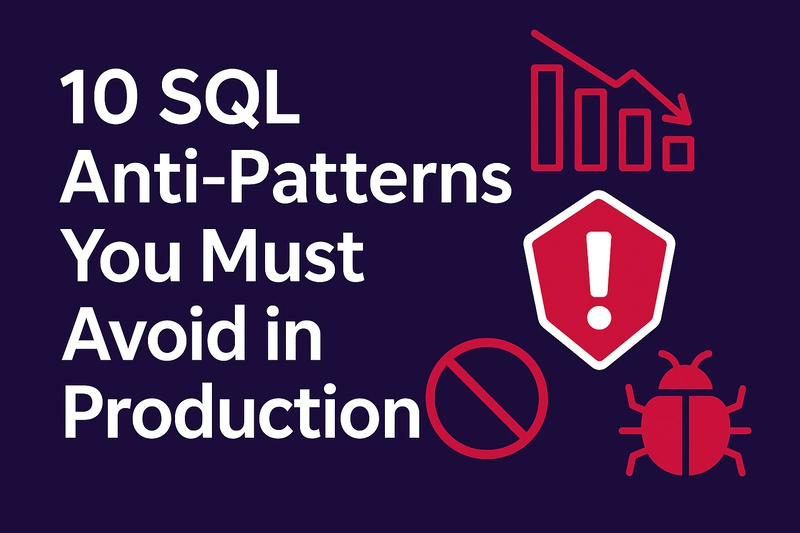10 SQL Anti-Patterns You Must Avoid in Production
“Slow SQL isn’t always about bad servers — it’s often about bad habits.”
As SQL developers and data engineers, we often prioritize functionality and overlook query quality. But poor SQL habits can lead to:
- Long response times
- Bottlenecked applications
- Excessive I/O and CPU
- Poor scalability
In this post, we’ll break down 10 critical SQL anti-patterns and how to fix them.
❌ 1. N+1 Query Pattern
Problem: Querying in a loop for each record.
-- BAD: Fetching orders per customer inside loop
SELECT * FROM Customers;
-- For each customer:
SELECT * FROM Orders WHERE customer_id = ?;
✅ Fix: Join and aggregate in one query
SELECT c.id, c.name, COUNT(o.id) AS order_count
FROM Customers c
LEFT JOIN Orders o ON o.customer_id = c.id
GROUP BY c.id, c.name;
❌ 2. Wildcard Index Scans
Problem: Leading wildcard disables index usage.
SELECT * FROM Products WHERE name LIKE '%phone';
✅ Fix: Use full-text search or structured LIKE
-- Better (index usable)
SELECT * FROM Products WHERE name LIKE 'phone%';
❌ 3. Implicit Data Type Conversions
Problem: Filtering numeric column with a string.
SELECT * FROM Orders WHERE id = '123';
✅ Fix: Match types explicitly
SELECT * FROM Orders WHERE id = 123;
🔍 Use query plans to detect implicit conversion overhead.
❌ 4. Scalar Subqueries in SELECT
Problem: Executing subquery for every row.
SELECT id, (SELECT COUNT(*) FROM OrderItems WHERE order_id = o.id)
FROM Orders o;
✅ Fix: Use join and aggregation
SELECT o.id, COUNT(oi.id) AS item_count
FROM Orders o
LEFT JOIN OrderItems oi ON oi.order_id = o.id
GROUP BY o.id;
❌ 5. SELECT * in Production
Problem: Fetches unnecessary columns, causes bloat.
SELECT * FROM Transactions;
✅ Fix: Select only what you need
SELECT id, amount, transaction_date FROM Transactions;
❌ 6. Redundant DISTINCT
Problem: Using DISTINCT to patch bad joins.
SELECT DISTINCT name FROM Customers c JOIN Orders o ON o.customer_id = c.id;
✅ Fix: Analyze join logic and duplicates instead.
❌ 7. Missing WHERE Clause in DELETE/UPDATE
-- Danger zone!
DELETE FROM Users;
UPDATE Orders SET status = 'Shipped';
✅ Fix: Always qualify with a WHERE clause.
DELETE FROM Users WHERE is_deleted = true;
❌ 8. No Index on Foreign Keys
Problem: FK lookups scan entire referenced table.
-- Missing index on Orders.customer_id
✅ Fix: Add supporting indexes
CREATE INDEX idx_orders_customer ON Orders(customer_id);
❌ 9. Overusing OR instead of UNION ALL
SELECT * FROM Orders WHERE status = 'pending' OR status = 'shipped';
✅ Fix: Separate indexed paths with UNION ALL
SELECT * FROM Orders WHERE status = 'pending'
UNION ALL
SELECT * FROM Orders WHERE status = 'shipped';
❌ 10. Not Using ANALYZE or EXPLAIN
Problem: Blindly writing queries without measuring impact.
✅ Fix: Always inspect query plans
EXPLAIN ANALYZE SELECT ...
Final Thoughts: Write It Once, Run It Well
Avoiding anti-patterns isn't just about style — it's about performance, reliability, and cost.
"SQL is declarative. Let the engine help — but don’t tie its hands with bad habits."
#SQL #Performance #AntiPatterns #QueryOptimization #BestPractices #AdvancedSQL #DataEngineering



Top comments (0)